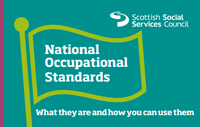About the NOS
What are National Occupational Standards (NOS)?
- NOS describe the knowledge, skills and understanding needed to do a particular job to a nationally recognised level of competence.
- NOS form the basis of qualifications and training programmes required to work in social services in Scotland and to register with the Scottish Social Services Council (SSSC).
- NOS are developed by employers, people who use services and other key stakeholders to define the key functions in a job role.
- NOS are benchmarks of good practice required in the social service sector and are used across the UK.
- NOS are developed for employers through the relevant sector skills council or standards-setting organisation.
- NOS are reviewed regularly and are added to over time.
How can NOS be used?
NOS can be used as benchmarks for qualifications. Eighty per cent of vocational qualifications in social care, early years and child care come from NOS. Qualifications include degrees and awards, professional development awards (PDAs), modern apprenticeships and higher national certificates (HNCs).
NOS can be used flexibly across:
- workforce development and planning
- recruitment and selection
- performance management
- career development
- develop learning resources
- work with training providers
- fitness to practise
- assessing international qualifications
- recognition of prior learning (RPL)
- business planning
- marketing
- risk management.
What are the benefits of NOS?
Organisations use NOS:
- to improve quality of their workforce and ensure best practice
- in their strategic approach to workforce development and planning
- to identify training needs and fill skills gaps
- to act as a benchmark for rewarding knowledge, skills and experience
- as a cost effective way to ensure consistency in recruitment and selection
- to support change management
- for business planning
- in marketing
- in risk management.
Individuals use NOS:
- to enhance personal effectiveness
- to develop self confidence
- to identify gaps in skills, knowledge and experience
- to improve practice
- to support career development and offer progression pathways
- for recognition of prior learning (RPL)
- to provide clarity about the service required for individuals who purchase their own services.



